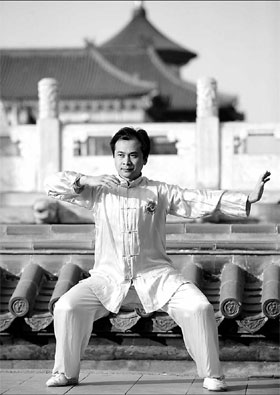The peaceful warrior
At a recent health lecture in Calgary, Canada, a qigong master, wearing a traditional white silk shirt, coached foreign students in a peaceful voice: "Slightly bend your knees, then turn the arms outward and hold them in a semicircle. Please concentrate".
Of an average stature and plain looking but with glittering eyes, Cui Yongsheng, is one of the Chinese Health Qigong Association masters touring the world and giving lectures during the Spring Festival.
The Qigong Association, an organization formed to popularize and research the breathing-based exercise, has sent six delegations to tour the United States, Britain, France, Belgium, Germany and Australia.
Last year, the association sent 11 delegations to give lectures and shows in 28 cities abroad. The program attracted more than 20,000 participants.
|
Cui Yongsheng practices qigong in Tiantan Park. Lu Zhongqiu |
"Qigong is not a simple body exercise. It is rooted in profound philosophy and culture. We aim to help more foreigners to practice qigong better and learn more about Chinese culture," Cui says.
Many of the students were middle-aged or seniors. A Canadian man in his 70s, who was skeptical of qigong's health benefits, became a regular student every time Cui taught in Canada. "He told me that he really felt his health is getting better since practicing qigong," Cui says.
After practicing qigong for a year, a Malaysian man, who was injured in a car accident, encouraged his family to follow the qigong delegation to learn the ancient exercises.
The understanding of the essence of qigong did not come to Cui from the very beginning. Born in 1973, at Mengyin county, of Shandong province, where the martial art of wushu is very popular, Cui grew up in a family whose forefathers were wujuren, or outstanding scorers in provincial wushu exams.
Intrigued by the 1982 film The Shaolin Temple, Cui began studying martial arts and qigong. Under the guidance of various masters, the clever young man improved rapidly.
"At that time, I liked to fight with others. Maybe in others' eyes, I was aggressive," the 35-year-old recalls.
His parents didn't allow him to practice wushu after his marks in middle school started falling. However, the stubborn teenager continued training on his own at night when everyone was asleep.
After graduating from high school, Cui's passion for wushu finally brought him to Shandong Institute of Physical Education and Sports in Ji'nan, the provincial capital. However, a fight in 1999 totally changed Cui's mindset.
On his way home before the Spring Festival that year, Cui unexpectedly came to blows with four men.
Abruptly jumping into his way and surrounding him, the four attacked Cui without any explanation.
Cui immediately punched one man in the face. With blood coming out of the man's mouth, the man cried out for losing two of his teeth. The fierce battle ended in less than 10 minutes. Without suffering a scratch, Cui easily beat the unknown challengers.
The victory didn't bring Cui happiness. The four men sued Cui, and the local court judged that Cui should pay them damages of about 10,000 yuan ($1,390).
"My parents were both ordinary workers. The compensation consumed almost all of my parents' savings," Cui says.
That Spring Festival filled him with regret and changed Cui's fondness of challenging others and being challenged.
The fight made Cui think more about the real meaning of wushu.
"When I was young, wushu was more about fighting skills to me," Cui says. "A vague feeling grew in my heart that wushu had much more profound philosophies."
When he heard that an ancient kung fu book was discovered in Guangzong county, Hebei province, Cui immediately went there to learn.
After half a day's walk, Cui finally found the aged master, who owned the book. But before he could see the precious book, he would have to undergo a unique test.
Many people had tried to see the book before Cui left to find the master. They had to kowtow to the master. But before their knees touched the ground, the old man would lift them up, so they couldn't complete the courtesy. Cui succeeded with quick and proper action.
Then the aged master agreed to lend Cui the book for two hours. Cui borrowed a bike and rode to the county to photocopy the book.
Learning avidly from ancient books, folk masters and university teachers, Cui made significant improvements. At a national 60-kg level pushing-hand competition, he won second place.
However, Cui believes his skills are still far outside the gate of true wushu. "I realize that wushu is more about cultivation of body and mind," he says.
He explains that wushu and qigong are inseparable.
"At the top level, both are channels to reach Tao, or the core spirit of Chinese philosophy, which requires a peaceful heart and emphasizes harmony between body and mind, and between humans and nature."
After six-years' research at Shanghai University of Sport, Cui became the school's first Chinese traditional sports PhD in 2005, focusing on qigong and its impact on health.
Later, Cui came to Beijing, where he met many "crouching tigers and hidden dragons", and has worked as a master for the Chinese Health Qigong Association.
The association teaches Yi Jin Jing, Ba Duan Jin, Liu Zi Jue and Wu Qin Xin - ancient qigong practices that Cui says can help one achieve harmony of body, breath and mind, and maintain balanced coordination of organic systems.
"Qigong mainly relies on the learners' own practice. Real qigong is neither a way to worship nor a religion."
(China Daily 02/05/2008 page20)















